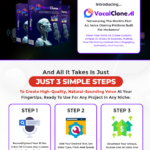Sick of the daily grind and itching for financial freedom? Look no further. The digital age offers a treasure trove of opportunities to earn extra cash from the comfort of your home. Whether you’re a seasoned entrepreneur or just starting out, there are countless ways to make money online without sacrificing your entire day.
From passive income streams to active side hustles, the possibilities are endless. In this article, we’ll explore some of the most promising and effective methods for generating online income. So, let’s dive in and discover how you can turn your spare time into a profitable venture.
My Proven Way to Make $100-$200 Per Day With 0 Investment – Watch THIS FREE Video to START >>

Niche Selection and Audience Understanding
In the vast digital landscape, finding your place can be overwhelming. That’s where niche selection comes into play. Think of it as carving out your own little corner of the internet, where you’re the expert. By specializing in a specific niche, you’re more likely to attract a dedicated audience, build trust, and ultimately monetize your efforts.
Why Niche Selection Matters:
- Targeted Audience: When you focus on a niche, you’re essentially narrowing down your target audience. This means you can tailor your content and marketing strategies to their specific needs and interests, increasing your chances of connecting with them on a deeper level.
- Competitive Advantage: A well-defined niche can give you a competitive edge. It’s easier to establish yourself as an authority in a smaller market than a broader one. By becoming the go-to expert in your niche, you’ll attract more traffic and potential customers.
- Monetization Opportunities: A niche-focused approach often leads to more lucrative monetization options. Whether it’s affiliate marketing, sponsored content, or selling your own products or services, a dedicated audience is more likely to convert into paying customers.
- Passion and Engagement: When you’re passionate about your niche, it shows in your content. This enthusiasm can be contagious, attracting like-minded individuals who are eager to engage with your work.
Identifying Your Target Audience:
Once you’ve chosen your niche, it’s time to define your ideal customer. Who are they? What are their pain points, desires, and aspirations? Understanding your target audience is essential for creating content that resonates with them and drives engagement.
Here are some questions to consider:
- Demographics: What is their age, gender, location, income level, and education level?
- Interests: What are their hobbies, passions, and interests?
- Problems: What challenges or problems do they face?
- Goals: What are their aspirations and what do they hope to achieve?
Keyword Research:
To reach your target audience effectively, you need to understand the language they use. Keyword research is the process of identifying the terms and phrases that your audience is searching for online. By incorporating these keywords into your content, you can improve your search engine rankings and attract organic traffic.
Here are some tips for conducting keyword research:
- Use Keyword Tools: There are many free and paid keyword research tools available, such as Google Keyword Planner, SEMrush, and Ahrefs. These tools can help you find relevant keywords and analyze their search volume, competition, and difficulty.
- Long-Tail Keywords: Instead of targeting highly competitive keywords, focus on long-tail keywords that are more specific and have lower competition. For example, instead of targeting the keyword “marketing,” you could target “social media marketing for small businesses.”
- Consider User Intent: When choosing keywords, think about the intent behind the search. Are people looking for information, products, or services? Tailor your content accordingly.
- Analyze Competitors: See what keywords your competitors are ranking for and try to outrank them.
By understanding your niche, identifying your target audience, and conducting thorough keyword research, you can create content that not only attracts but also engages and converts your ideal customers.
My Proven Way to Make $100-$200 Per Day With 0 Investment – Watch THIS FREE Video to START >>
Building Trust and Authority
In the crowded online marketplace, standing out requires more than just great content. Trust and authority are essential elements that can help you build a loyal following and establish your brand as a reputable source of information.
Content Quality:
The cornerstone of trust and authority is high-quality content. This means creating informative, well-written, and valuable pieces that address your audience’s needs and interests. When you consistently deliver quality content, you demonstrate your expertise and credibility, encouraging your audience to trust your recommendations.
Here are some tips for creating high-quality content:
- Research: Thoroughly research your topic to ensure accuracy and provide valuable insights.
- Clarity: Write in a clear and concise manner, avoiding jargon or technical terms that may confuse your audience.
- Engagement: Make your content engaging by telling stories, using examples, and asking questions.
- Originality: Avoid plagiarism and strive to offer a unique perspective on your topic.
Consistency:
Consistency is key when it comes to building trust and authority. Regularly updating your content shows your audience that you’re committed to your niche and that you’re always learning and growing. It also helps you stay top of mind with your audience, increasing your chances of them returning to your website or social media channels.
Here are some tips for maintaining consistency:
- Content Calendar: Create a content calendar to plan out your topics and publishing schedule.
- Batching: Batch your content creation to save time and ensure a steady stream of updates.
- Quality over Quantity: Focus on producing high-quality content rather than churning out low-quality pieces.
Building Relationships:
Building relationships with your audience is another crucial aspect of establishing trust and authority. By connecting with your readers on a personal level, you can create a sense of community and loyalty.
Here are some ways to foster connections with your audience:
- Social Media: Engage with your audience on social media by responding to comments, messages, and mentions.
- Email Marketing: Build an email list and send regular newsletters to keep your audience updated and engaged.
- Community Building: Create a community around your brand, such as a forum or Facebook group.
- Personal Branding: Share your personal story and connect with your audience on a more human level.
By focusing on content quality, consistency, and building relationships, you can establish yourself as a trusted authority in your niche. This will not only attract more traffic and followers but also increase your chances of monetizing your efforts.
My Proven Way to Make $100-$200 Per Day With 0 Investment – Watch THIS FREE Video to START >>
Effective Affiliate Marketing Strategies
Affiliate marketing offers a lucrative opportunity to earn passive income by promoting other people’s products or services. To maximize your success, it’s essential to choose the right affiliate programs and employ effective promotion strategies.
Affiliate Program Selection:
When selecting affiliate programs, consider the following factors:
- Niche Alignment: Ensure that the products or services align with your niche and audience.
- Commission Rates: Compare commission structures to find programs that offer competitive payouts.
- Cookie Duration: Look for programs with longer cookie durations, which allow you to earn commissions from sales that occur after a visitor clicks on your affiliate link.
- Promotion Materials: Evaluate the quality and quantity of promotional materials provided by the affiliate program.
- Brand Reputation: Choose programs with reputable brands that your audience trusts.
Promotion Methods:
Once you’ve selected your affiliate programs, it’s time to promote them effectively. Here are some popular promotion methods:
- Social Media: Leverage social media platforms to share your affiliate links and engage with your audience. Create valuable content that showcases the benefits of the products or services you’re promoting.
- Email Marketing: Build an email list and send targeted campaigns to your subscribers. Promote relevant affiliate offers and provide exclusive discounts or bonuses.
- Content Marketing: Create high-quality content, such as blog posts, reviews, or tutorials, that feature the products or services you’re promoting. Incorporate your affiliate links naturally within the content.
- Paid Advertising: Consider using paid advertising platforms like Google Ads or social media ads to reach a wider audience.
- Influencer Marketing: Partner with influencers in your niche to promote the products or services you’re affiliated with.
Tracking and Analytics:
To measure the effectiveness of your affiliate marketing campaigns, it’s essential to use tracking tools. These tools can help you track clicks, conversions, and earnings, allowing you to identify what’s working and what’s not.
Here are some popular tracking tools:
- Affiliate Network Tracking: Most affiliate networks provide their own tracking tools to help you monitor your performance.
- Google Analytics: Use Google Analytics to track website traffic, conversions, and user behavior.
- Link Shorteners: Shorten your affiliate links to make them more visually appealing and track clicks.
By carefully selecting affiliate programs, utilizing effective promotion methods, and tracking your performance, you can build a successful affiliate marketing business and generate substantial income.
Optimization for Search Engines
To maximize your reach and attract organic traffic, it’s essential to optimize your affiliate marketing content for search engines. This involves implementing both on-page and off-page SEO strategies.
On-Page SEO:
- Keyword Optimization: Incorporate your target keywords throughout your content, including in the title, headings, meta descriptions, and body text. Use keyword tools to identify relevant keywords and analyze their search volume and competition.
- Meta Descriptions: Write compelling meta descriptions that accurately summarize your content and entice users to click through.
- Header Tags: Use header tags (H1, H2, H3, etc.) to structure your content and improve readability.
- Image Optimization: Optimize your images with descriptive file names and alt text to improve search engine visibility and accessibility.
- Internal Linking: Link to other relevant pages on your website to improve navigation and help search engines understand your content structure.
Off-Page SEO:
- Backlink Building: Acquire high-quality backlinks from reputable websites to improve your website’s authority and search engine rankings. This can be done through guest posting, outreach, and building relationships with other websites in your niche.
- Social Media: Share your content on social media platforms to increase visibility and generate backlinks.
- Local SEO: If your target audience is primarily local, optimize your website for local search by creating a Google My Business listing and including local keywords in your content.
Technical SEO:
- Website Speed: Ensure your website loads quickly to improve user experience and search engine rankings. Optimize your images, minify code, and use a fast web host.
- Mobile-Friendliness: Make sure your website is mobile-friendly, as Google prioritizes mobile-first indexing.
- XML Sitemap: Create an XML sitemap to help search engines crawl and index your website’s content.
- HTTPS: Use HTTPS to secure your website and improve user trust.
By implementing effective SEO strategies, you can improve your website’s visibility in search engine results pages and attract more organic traffic to your affiliate marketing content.
My Proven Way to Make $100-$200 Per Day With 0 Investment – Watch THIS FREE Video to START >>
Continuous Learning and Adaptation
The affiliate marketing landscape is constantly evolving, so it’s essential to stay updated on the latest trends and best practices. Additionally, testing and experimentation are crucial for identifying what works and what doesn’t. By adapting to changes and continuously learning, you can stay ahead of the curve and maximize your affiliate marketing success.
Staying Updated:
- Industry News: Follow industry blogs, publications, and social media accounts to stay informed about the latest trends, updates, and best practices.
- Webinars and Conferences: Attend webinars and conferences to learn from experts and network with other affiliate marketers.
- Online Courses: Take online courses or workshops to acquire new skills and knowledge.
- Affiliate Network Updates: Keep up-to-date with the latest announcements and changes from your affiliate networks.
Testing and Experimentation:
- A/B Testing: Test different elements of your affiliate marketing campaigns, such as headlines, images, or call-to-actions, to see what performs best.
- Campaign Tracking: Use tracking tools to measure the effectiveness of your campaigns and identify areas for improvement.
- Data Analysis: Analyze your data to identify patterns and trends that can inform your future strategies.
- Experimentation: Don’t be afraid to try new things and experiment with different approaches.
Adapting to Changes:
- Algorithm Updates: Stay informed about search engine algorithm updates and adjust your strategies accordingly.
- Consumer Behavior: Keep an eye on changes in consumer behavior and preferences to ensure your content remains relevant.
- Market Trends: Adapt to emerging market trends and identify new opportunities.
- Platform Changes: Stay updated on changes to social media platforms and other online channels that you use for affiliate marketing.
By staying updated, testing and experimenting, and adapting to changes, you can ensure that your affiliate marketing efforts remain effective and profitable in the long run. Remember, affiliate marketing is an ongoing process that requires continuous learning and refinement.
My Proven Way to Make $100-$200 Per Day With 0 Investment – Watch THIS FREE Video to START >>
Conclusion
In conclusion, affiliate marketing offers a lucrative opportunity to earn passive income from the comfort of your home. By following the proven strategies outlined in this article, you can build a successful affiliate marketing business and achieve financial freedom.
Remember, success in affiliate marketing requires dedication, consistency, and a willingness to learn and adapt. By staying updated on industry trends, testing different strategies, and building strong relationships with your audience, you can position yourself for long-term success in this rewarding field.









